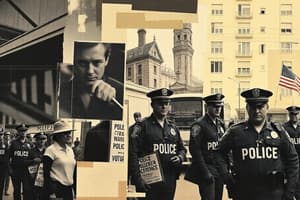Podcast
Questions and Answers
What is the primary focus of the proposed shift in management approaches for community policing?
What is the primary focus of the proposed shift in management approaches for community policing?
- Discipline and compliance
- Leadership and empowerment (correct)
- Quantitative performance measures
- Centralized budgeting
Which of the following measures is suggested as a more appropriate metric for recognizing and promoting officers?
Which of the following measures is suggested as a more appropriate metric for recognizing and promoting officers?
- Total citations issued
- Number of arrests made
- Public satisfaction (correct)
- Performance metrics of stops and searches
What organizational change is proposed in relation to local policing budgets?
What organizational change is proposed in relation to local policing budgets?
- Devolution of budget control to local commanders (correct)
- Increased funding from central authorities
- Reduction of local commanders' budgetary power
- Complete centralization of budget control
What fundamental condition is necessary for successful community policing to occur?
What fundamental condition is necessary for successful community policing to occur?
Why might the implementation of community policing strategies often prove to be elusive?
Why might the implementation of community policing strategies often prove to be elusive?
Which aspect of community policing management is suggested to be changed from traditional methods?
Which aspect of community policing management is suggested to be changed from traditional methods?
What challenge is implied in converting strategic objectives into tactical successes in community policing?
What challenge is implied in converting strategic objectives into tactical successes in community policing?
What type of environment is deemed unsuitable for establishing community policing?
What type of environment is deemed unsuitable for establishing community policing?
What is the primary aim of the problem-oriented model of policing developed by Goldstein?
What is the primary aim of the problem-oriented model of policing developed by Goldstein?
Which of the following is NOT identified as a key component in successful community policing strategies?
Which of the following is NOT identified as a key component in successful community policing strategies?
According to the literature reviewed, which aspect equally contributes to the effectiveness of community policing?
According to the literature reviewed, which aspect equally contributes to the effectiveness of community policing?
What kind of roles do Groenewald and Peake emphasize should be clearly defined in community policing?
What kind of roles do Groenewald and Peake emphasize should be clearly defined in community policing?
What does the problem-oriented model of policing require from police interventions?
What does the problem-oriented model of policing require from police interventions?
What is a potential consequence of lacking effective oversight in community policing?
What is a potential consequence of lacking effective oversight in community policing?
Which of the following reflects a philosophical shift in community policing?
Which of the following reflects a philosophical shift in community policing?
What intention underlies the creation of transparent processes in police accountability?
What intention underlies the creation of transparent processes in police accountability?
What is the primary role of police in autocratic regimes as described?
What is the primary role of police in autocratic regimes as described?
Which of the following is NOT mentioned as a supporting pillar essential for effective community policing?
Which of the following is NOT mentioned as a supporting pillar essential for effective community policing?
What factor is suggested as a barrier to the successful implementation of community policing in democratic countries?
What factor is suggested as a barrier to the successful implementation of community policing in democratic countries?
In democratic policing, what is necessary for building public trust?
In democratic policing, what is necessary for building public trust?
Which are the obstacles likely found in dictatorial regimes that hinder community policing?
Which are the obstacles likely found in dictatorial regimes that hinder community policing?
What term refers to the internal culture within police that may negatively affect community policing?
What term refers to the internal culture within police that may negatively affect community policing?
What is a consequence of lacking essential pillars of support in community policing?
What is a consequence of lacking essential pillars of support in community policing?
Which concept emphasizes that community policing cannot exist in isolation?
Which concept emphasizes that community policing cannot exist in isolation?
What does Bourdieu's concept of habitus primarily describe?
What does Bourdieu's concept of habitus primarily describe?
How has the police workforce in Britain changed over the last thirty years?
How has the police workforce in Britain changed over the last thirty years?
What barrier does the change in the police workforce create for community policing?
What barrier does the change in the police workforce create for community policing?
What significant reform occurred regarding police housing after the mid-1990s?
What significant reform occurred regarding police housing after the mid-1990s?
According to Bourdieu, how is social space defined?
According to Bourdieu, how is social space defined?
What has been a consequence of the transformation of police population from working-class to middle-class?
What has been a consequence of the transformation of police population from working-class to middle-class?
What criticism is implied by Bourdieu regarding the modern police force?
What criticism is implied by Bourdieu regarding the modern police force?
What impact does a graduate police workforce have on community policing?
What impact does a graduate police workforce have on community policing?
What is one proposed advantage of establishing a new National Constabulary?
What is one proposed advantage of establishing a new National Constabulary?
Which aspect of policing is highlighted as a vulnerability in the current system?
Which aspect of policing is highlighted as a vulnerability in the current system?
What is suggested as a necessary condition for the survival of valued aspects of UK policing?
What is suggested as a necessary condition for the survival of valued aspects of UK policing?
What primary role would the new National Constabulary be expected to assume?
What primary role would the new National Constabulary be expected to assume?
How might the establishment of a National Constabulary affect existing police forces?
How might the establishment of a National Constabulary affect existing police forces?
What do proponents of the new National Constabulary suggest about the current policing infrastructure?
What do proponents of the new National Constabulary suggest about the current policing infrastructure?
What is indicated to be a significant concern among some police leaders regarding the proposed changes?
What is indicated to be a significant concern among some police leaders regarding the proposed changes?
Which community-focused aspect would remain under local provincial forces according to the proposal?
Which community-focused aspect would remain under local provincial forces according to the proposal?
Flashcards are hidden until you start studying
Study Notes
Problem-Oriented Model of Policing
- Developed by Goldstein, the model emphasizes in-depth analysis of community crime problems to craft effective crime prevention strategies.
- It involves targeted response efforts and assessment of police intervention impacts on community issues.
Philosophy of Community Policing
- Community policing reshapes policing to be proactive and engaged with communities, rather than solely reactive law enforcement.
- Law enforcement continuance is essential, but a shift towards engagement in community networks is prioritized.
Key Components for Successful Community Policing
- Identified critical elements: partnerships, decentralization, and problem-solving, providing both flexibility and accountability.
- Study highlights the need for additional supporting structures to ensure community policing initiatives are effective and sustainable.
Oversight and Accountability
- Successful community policing requires robust oversight mechanisms with real authority to address issues.
- Clear division of roles and responsibilities is integral, including civilian participation in oversight activities.
- Shifts from traditional hierarchical management to focus on leadership and empowerment are necessary.
- Police officer incentives should align with community satisfaction rather than just quantitative performance indicators.
Challenges to Community Policing Implementation
- Effective community policing can only thrive in a democratic context where constitutional rights are upheld.
- In non-democratic regions, policing often suppresses dissent rather than serving the community, lacking accountability and human rights focus.
Supporting Pillars for Community Policing
- Essential pillars include: political oversight (not direct control), independent judiciary, free press, strong civil society, public accountability, and a commitment to human rights.
- A lack of these pillars often exists in autocratic regimes, hindering community policing potential.
Police Culture and Community Policing
- Police culture presents significant barriers to the successful establishment of community policing programs.
- Concerns about 'canteen culture' highlight the corrosive aspects of traditional police culture on community engagement.
- The transition of police workforce demographics from working-class to a predominantly middle-class, graduate-level profession contributes to social distance from communities.
Physical and Social Space Dynamics
- Changes in police workforce composition affect spatial relationships and community integration.
- Officers moving away from communities they serve reduces personal ties and understanding of local issues.
Suggested Reforms for Policing Structure
- A call for a new National Constabulary to enhance the enforcement arm, filling gaps across various jurisdictions.
- Such a force should handle firearms operations, public order policing, counter-terrorism, and border security.
- Establishing a national force may be controversial but is argued as necessary for adapting to modern policing demands while preserving local accountability and governance.
Studying That Suits You
Use AI to generate personalized quizzes and flashcards to suit your learning preferences.




